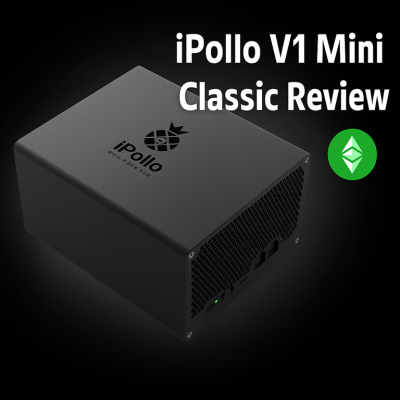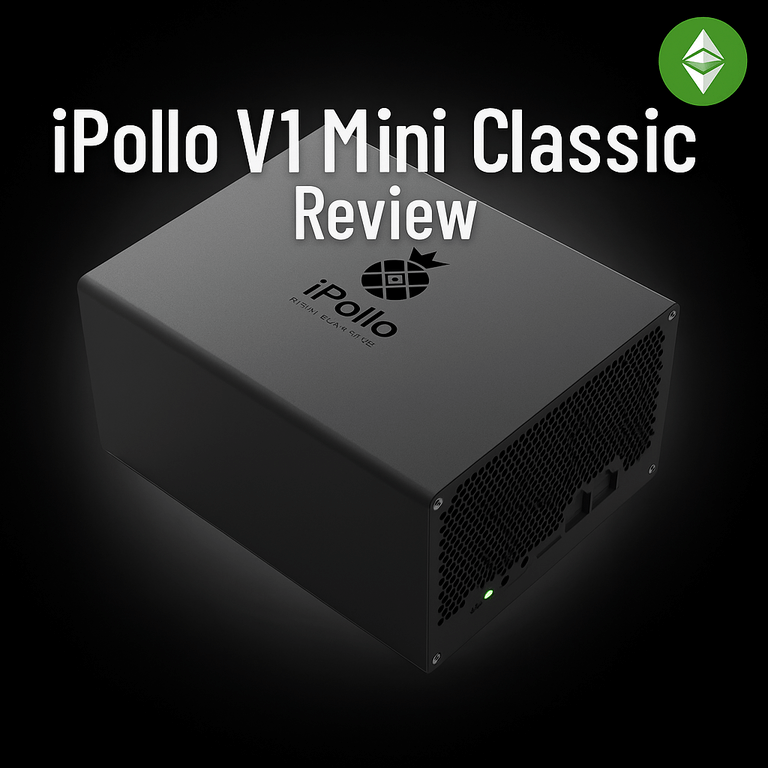iPollo V1 Mini Classic Review
iPollo V1 Mini Classic is a compact ETC miner for a desk or shelf. It delivers around 130 MH/s at about 104 W with a simple web UI. This review explains setup, ETC+ZIL notes, power cost, and current prices.

Pros:
- Desk‑friendly: ~104 W, compact chassis, low tonal noise for living spaces.
- Simple setup: Ethernet / Wi‑Fi (model‑dependent) with a clean web interface.
- ETC‑first with ETChash/Ethash support; many pools offer ETC + ZIL cycles.
- Low daily running cost vs. larger ASICs.
Cons:
- Not ROI‑oriented at typical residential tariffs—treat as a learning/stacking device.
- Memory‑limited (Classic: ~3.6 GB usable)—fine for ETC DAG today; always check coin DAG size.
- Bundle variance: some sellers include PSU; others don’t. Confirm voltage/connector and regional plug.
If you want a quieter but much faster ETC miner, see our Jasminer X16‑Q review. For different algorithms, check our Scrypt Mini‑DOGE II or SHA‑256 Avalon Nano 3S.
Key Takeaways
- Throughput & power (Classic Wi‑Fi): ~130 MH/s @ ~104 W → ~0.80 J/MH (lower is better).
- Noise: home‑friendly whoosh when placed on a firm, open surface.
- Algorithm: Etchash/Ethash — designed for Ethereum Classic.
- Variants:
• V1 Mini 260 MH/s @ ~220 W (Wi‑Fi)
• V1 Mini 300 MH/s @ ~240 W (Wi‑Fi)
• V1 Mini Classic Plus 280 MH/s @ ~270 W
All share a similar small form factor; choose by speed vs power.
Technical Specifications

| Item | Spec |
|---|---|
| Algorithm | Etchash / Ethash (ETC‑first; ZIL cycles on supported pools) |
| Hashrate (typ.) | ~130 MH/s (±10%) |
| Power (typ.) | ~104 W (±10%) @ wall |
| Efficiency (math) | ~0.80 J/MH (104 W ÷ 130 MH/s) |
| Noise (listed) | Low, desk‑friendly (fan tone depends on placement) |
| Networking | Ethernet; some batches Wi‑Fi (check variant) |
| Voltage | 100–240 V AC (external PSU; confirm inclusion) |
| Memory | 3.75 GB design, ~3.6 GB usable |
| Dimensions / Weight | ~148 × 158 × 78 mm, ~1 kg |
Plain‑English examples: 130 MH/s = 130 million hashes per second. 104 W is like a bright desk lamp. 0.80 J/MH means 0.8 joule per million hashes.
Performance, Noise & Heat
Expect ~120–140 MH/s after warm‑up, pulling ~100–110 W depending on PSU quality and ambient temps. Noise is a soft fan whoosh; placing the miner on a hard, open surface reduces resonance. Keep the rear exhaust clear.
Heat output (rule‑of‑thumb)
1 W ≈ 3.412 BTU/h → 104 W ≈ ~355 BTU/h — mild local warmth, not a heater.
Electricity cost examples (24 h, continuous @ 104 W)
- €0.10/kWh → ~€0.25/day (~€7.5/month)
- €0.20/kWh → ~€0.50/day (~€15.0/month)
- €0.30/kWh → ~€0.75/day (~€22.5/month)
Formula: kWh = (Watts ÷ 1000) × hours.
Setup & Pooling (quick start)
- Place & power: Leave intake/exhaust clear. Verify PSU included; if not, use a quality adapter rated for the unit. Short, thick DC cables reduce voltage drop.
- Network: Connect Ethernet (RJ45). If cabling is hard, use a small Wi‑Fi‑to‑Ethernet bridge.
- Web UI: Open the device IP in your browser; set pool URL, wallet, and worker.
Example ETC pools: 2miners, flexpool, hiveon (ETC).
Stratum example:stratum+tcp://etc.2miners.com:1010
Username: your ETC address (0x...) or pool account
Password:x(or as required). - (Optional) ZIL cycles: some pools offer ETC + ZIL. Follow the pool’s guide for dual‑mining setup.
- Verify & monitor: After 5–10 min, hashrate stabilizes. Watch Rejected/Stale shares; if they rise, improve network quality or change pool server.
Beginner tip: If a pool shows stale shares > 2–3%, try a closer server, check your router, or switch to Ethernet.
Who Should Buy the V1 Mini Classic?
- Home/apartment users who want quiet ETC mining in a small form factor.
- Beginners who prefer plug‑and‑play mining with a browser UI.
- Tinkerers who want low power draw and simple day‑to‑day running costs.
Skip it if you need GH/s‑level throughput or heater‑level warmth—see the Alternatives below.
Alternatives & Comparisons
Explore more devices on our Etchash reviews index
| Product | Hashrate (typ.) | Power • Efficiency • Notes |
|---|---|---|
| iPollo V1 Mini Classic (this) | ~130 MH/s | ~104 W • ~0.80 J/MH • compact; Ethernet/Wi‑Fi |
| iPollo V1 Mini (260 MH/s) | ~260 MH/s | ~220 W • ~0.85 J/MH • Wi‑Fi; faster variant |
| iPollo V1 Mini (300 MH/s) | ~300 MH/s | ~240 W • ~0.80 J/MH • Wi‑Fi; highest mini speed |
| iPollo V1 Mini Classic Plus | ~280 MH/s | ~270 W • ~0.96 J/MH • Classic‑line upgrade |
| Jasminer X16‑Q | ~1.95 GH/s | ~620 W • ~0.32 J/MH • very quiet for its class |
Related internal links
- All Etchash/Ethash reviews
- All reviews
Verdict
The V1 Mini Classic is one of the easiest ways to mine ETC at home: 130 MH/s, ~104 W, quiet operation, and a web UI. It’s ideal for learning, stacking, and low‑impact 24/7 running. If you want more throughput (and can handle higher power), step up to the iPollo V1 Mini 260/300 or the Jasminer X16‑Q.
FAQ's
Is the V1 Mini Classic profitable at home?
Depends on ETC price and your €/kWh. Budget around 2.5 kWh/day at 104 W before pool fees.
Is it truly quiet?
It’s apartment‑friendly when placed correctly; fan tone varies with room acoustics.
Does it include a PSU?
Some sellers include it; others don’t. Check the listing and make sure the plug type fits your region.
Wi‑Fi built‑in?
The Classic Wi‑Fi model has Wi‑Fi; other batches may be Ethernet‑only—confirm before buying.
ETC + ZIL possible?
Yes on supported pools; follow your pool’s dual‑mining guide.
